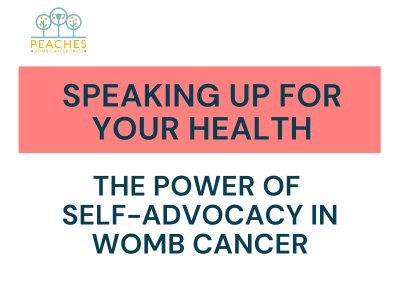The Power of Self-Advocacy in Womb Cancer Awareness
September marks Gynaecological Cancer Awareness Month — a chance to talk openly about cancers that affect the reproductive system, including womb cancer, which is the most common gynaecological cancer.
At Peaches, we believe that spotting symptoms is only part of the picture. Feeling comfortable enough to speak up, ask questions, and push for answers — especially when something doesn’t feel right — is just as important.
What Is Self-Advocacy?
Self-advocacy is about listening to your body, trusting your instincts, and knowing that your concerns matter — and that you have the right to be heard.
It can mean:
- Speaking up if you notice something unusual
- Asking questions at your appointments
- Requesting follow-up or a second opinion if you’re unsure
- Pushing for tests if you feel something’s been missed
You don’t need to be forceful — it’s simply about knowing your health matters, and that you deserve to be taken seriously.
Why Self-Advocacy Matters in Womb Cancer
Womb cancer often has early warning signs, like unusual bleeding. But sometimes these get explained away — especially if you’re younger, have a different medical history, or don’t “fit” the profile doctors expect.
Too many people hear things like “It’s normal”, “It’s just hormones”, or “It’s nothing to worry about.” But if something feels different, new, or worrying to you — that’s important.
You know your body better than anyone else. If something doesn’t seem right, it deserves proper attention.
Tips for Speaking Up
If you’re worried about symptoms, or feel you haven’t been fully heard, here are some ways to advocate for yourself:
1. Keep a Symptom Diary
Write down what’s happening, when it started, how often it occurs, and how it’s affecting your day-to-day life. This helps your GP see the bigger picture.
2. Be Clear and Direct
You might say:
- “I’m concerned about this change in my body.”
- “I know something isn’t right.”
- “I’d like to explore this further.”
3. Ask for Specific Tests or Referrals
If you feel your concerns are being brushed aside, it’s okay to ask for a pelvic exam, an ultrasound, or to see a specialist.
4. Bring Someone with You
A friend or family member can offer support and help remember details you forget to mention.
5. Don’t Be Afraid to Get a Second Opinion
It’s completely fine to seek another medical opinion if you still feel unsure or dismissed.
Your Voice Could Save Your Life
Speaking up can be hard, especially in a busy healthcare system or if you’re feeling anxious. But advocating for yourself is one of the most powerful acts of self-care you can take.
Early diagnosis often means more effective treatment, and it can start with you saying “Something’s not right.”
We’re With You Every Step
At Peaches, we believe no one should face womb cancer feeling unheard or alone. If you want information, support, or guidance on how to raise your concerns with your doctor, we’re here.
You can contact us at [email protected].
You matter. Your voice matters and you are not alone.


